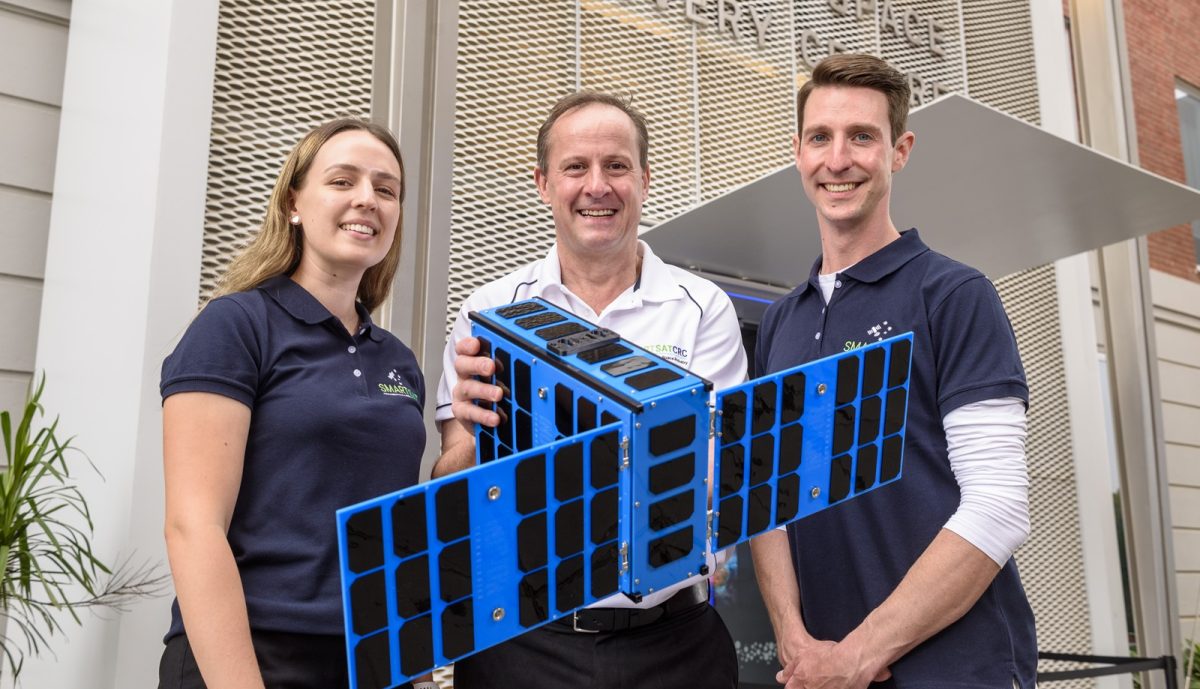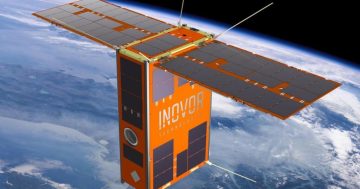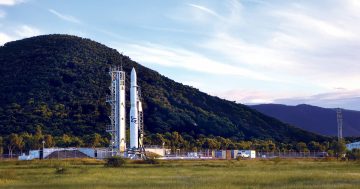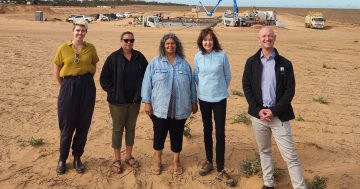
SmartSat CRC engineers Nadia Sarunic, Peter Nikoloff (centre) and Nick Manser hold a mock-up of the satellite. Photo: SmartSat CRC.
A small satellite designed and built in South Australia was successfully launched into space by a SpaceX Falcon rocket from the US on 16 August.
The $6.5 million Kanyini satellite was built by a team of South Australian companies – SmartSat CRC, Inovor and Myriota – and was funded by the State Government. It is the first satellite to be built using a wholly Australian supply chain.
The six-unit CubeSat is about the size of a large shoebox and weighs about 12 kilograms. It has three major components: the Apogee Bus, the HyperScout sensor and the IoT sensor.
The Apogee Bus is the CubeSat’s shell or casing and was manufactured by Inovor Technologies in Adelaide. The Bus provides the power system, pointing system, mission control and telemetry systems for the satellite in a lightweight, modular structure.
The HyperScout 2 Flight Model hyperspectral imager is described as an instrument that combines hyperspectral and thermal imaging with high-level data-processing and artificial intelligence (AI) capabilities. It is used for detailed Earth observation imagery designed to support research into crop health, forestry, inland and coastal water management and more.
The IoT Space Services device is built by Myriota and provides the data-transfer capability for the satellite, sending data from IoT devices and sensors on Earth’s surface to the satellite via a secure cloud. The IoT is applicable for use by emergency services and for environmental monitoring such as extreme weather events.
Once communications have been established from Inovor Technologies in Adelaide’s Lot Fourteen tech centre, Kanyini will deliver space data for use by government and research institutions, particularly in the areas of sustainability and climate impacts.
The research initiatives to be undertaken by Kanyini include early bushfire detection – with technology that can detect fires from space 500 times faster than traditional processing.
The satellite will also support a program – led by the South Australian Department for Environment and Water and Greening Adelaide – to sense urban heat islands in the state.
Data collected by Kanyini will also be used to develop robust and trustworthy predictive AI capabilities that can accurately forecast natural disaster events such as landslides and flooding, being led by Queensland University of Technology and European Space Agency Phi-Lab.
SA Minister for Defence and Space Industries Stephen Mullighan described Kanyini’s launch as a significant milestone and a pivotal step forward for South Australia’s space sector.
“We are excited for Kanyini to unlock more opportunities for research and development of innovative, sovereign Australian space technologies,” he said.
“This project will also inspire talented Australians to pursue a career in the space industry as engineers and future space leaders.”
SmartSat CRC CEO Andy Koronios said the launch was a giant leap for South Australia’s space sector.
“The Kanyini mission is not just about sending a satellite into space; it’s about building South Australia’s capabilities and contributing valuable data for applications that enhance our lives here in South Australia,” he said.
“We have now realised our mission of seeing homegrown South Australian space technologies launched into low Earth orbit. The coming months will be crucial as the team works to fully operationalise Kanyini and begin reaping the benefits of its data-gathering capabilities.”
Inovor CEO Dr Matt Tetlow said putting anything into space was an extraordinary feat, and the launch was an excellent achievement.
“The collaborative effort from the whole mission team, including SmartSat CRC and Myriota, as well as the support from the South Australian Government, has been critical for the success of Kanyini,” he said.
Myriota CTO and co-founder Dr David Haley said the launch was a major milestone in the delivery of IoT connectivity globally.
“This launch is a testament to the collaborative efforts of the Kanyini team in preparing the 6U CubeSat and our onboard IoT payload to withstand the harsh conditions of space,” he said.
“As part of Myriota’s commercial IoT constellation, Kanyini will be instrumental in delivering critical field data to users across a range of key industries.”







